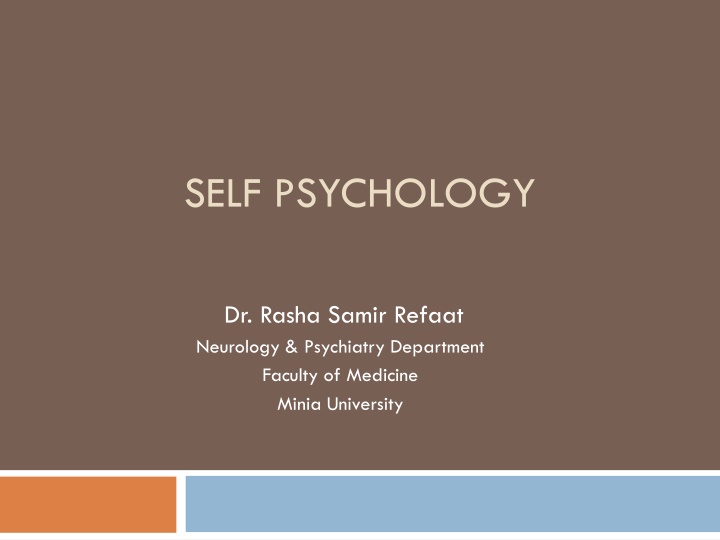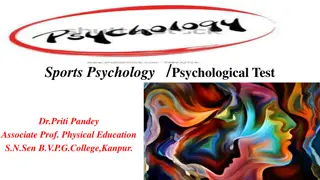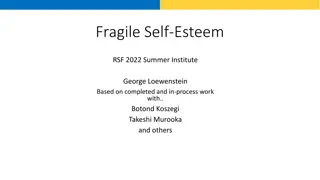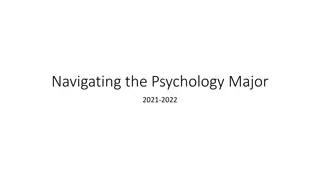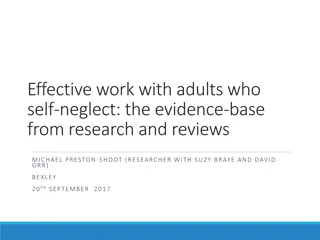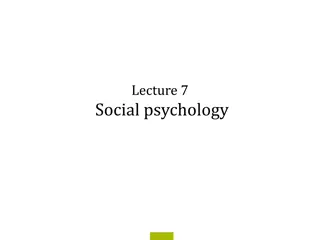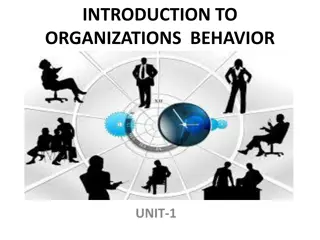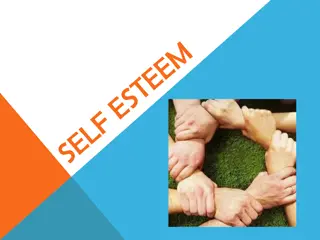SELF PSYCHOLOGY
"Dr. Rasha Samir Refaat is an expert in self-psychology within the Neurology & Psychiatry Department at Minia University's Faculty of Medicine. With a focus on the intersection of psychology and neurology, Dr. Refaat offers valuable insights into understanding the complexities of the human mind. Her work delves deep into the connections between psychological processes and brain functionality, shedding light on innovative approaches to mental health and well-being."
Download Presentation

Please find below an Image/Link to download the presentation.
The content on the website is provided AS IS for your information and personal use only. It may not be sold, licensed, or shared on other websites without obtaining consent from the author.If you encounter any issues during the download, it is possible that the publisher has removed the file from their server.
You are allowed to download the files provided on this website for personal or commercial use, subject to the condition that they are used lawfully. All files are the property of their respective owners.
The content on the website is provided AS IS for your information and personal use only. It may not be sold, licensed, or shared on other websites without obtaining consent from the author.
E N D
Presentation Transcript
SELF PSYCHOLOGY Dr. Rasha Samir Refaat Neurology & Psychiatry Department Faculty of Medicine Minia University
Introduction Self psychology is a theoretical and clinical school of psychological thought founded by Heinz Kohut, MD (1913-1981). Self psychology is widely accepted today as one of the central psychoanalytic theories (Siegel, 1996).
Origin of the theory After world war II classical psychoanalysis was too 1) focused on individual guilt and failed to reflect emotional interests and needs of people struggling with issues of identity, meaning, ideals, and self- expression.
2) Kohuts significant observation that many of the leaders (who is brilliant, well-analyzed men) fought over who spoke first or where they sat on a podium. 3) His study of narcissistically diseased patients, kohut's could formulate his basic concepts of self psychology
Core Concepts of Self Psychology The self According to Kohut the self is viewed as a process or system that organizes subjective experience. It consists of sensations, feelings, thoughts, and attitudes toward oneself and the world.
Self cohesion: A sense that all features of one s personality are facets of a single, well-integrated structure. Achieved when people possess a stable, positively valued, and congruent set of qualities, ambitions, ideals, and values, and are able to accomplish their goals without being rejected or isolated from significant others and important reference groups.
This self-structure can maintain a sense of inner security and resilience, calm a person in times of stress, and repair wounds to self-esteem inflicted by temporary failures, rejections, and disappointments (Kohut, 1984).
Selfobject: Is another person, thing or live event that we experience as if it were a functioning part of our endopsychic life. Selfobjects are intimately involved in regulating self esteem, calming and soothing the self, and containing affects and drives. We need selfobjects in our environment for emotional survival much as we need oxygen in the atmosphere for physical survival (Kohut, 1984).
Self psychology defines three basic lines of selfobject development (called selfobject needs): Mirroring need 1) 2) Idealizing need 3) Twin-ship need.
1) Mirroring self-object need: In the mirroring self-object need the child looks to the mother for a confirming and validating response that Kohut linked to the "gleam in the mother's eye . These approving responses are essential for normal development in that they provide the child with a sense of self-worth.
When a mother fails to empathize with her child's need for such a mirroring response, the later has great difficulty in maintaining a sense of self cohesion. the child's sense of self fragments and the child desperately attempts to be perfect and to "perform" for the parent to gain the hungered-for approbation.
2) Idealization need: Is regarded as omnipotent and all-controlling, and the perfection of which the child would like to share by means of merging.
In the development process, the child thus always goes back and forth between the desire for acknowledgement and love for his or her own achievements (mirroring)) and the (idealization) of the parents by wishing to become exactly as they are.
3) Twinship need: This focuses around a sense of human likeness to others and being a valued and important member of a group, such as a family, professional or leisure activity group.
From this association a person feels included, accepted and affirmed. This is particularly true when we know we are essential and useful to the maintenance of the other members and to the group as a whole (Kohut, 1984).
Optimal frustration When a selfobject is needed, but not accessible, this will create a potential problem for the self, referred to as a "frustration." This is solved, optimally, by imagining the object's presence, thus creating a "surrogate" selfobject until the selfobject is available. However, there is an optimal level of frustration with having the selfobject needs provided (a gap). This gap is sufficiently small that it can encourage one to take over such for oneself the provision of self needs rather than discouraging one
Developmental failure and psychopathology Lack of self-cohesion. Self fragmentation means regression of the self toward lessened cohesion. lack of confidence in one s ability to deal with life s hardships. vulnerable self-esteem.
become focused on their deficiencies, extremely vulnerable to criticism and failure, and overwhelmed by negative emotions, pessimistic thoughts. become preoccupied with fantasies of perfection and power, tend to exaggerate their achievements and talents.
Criticisms of self psychology 1- Obscurity of much of the theoretical statements of Kohut (Goldberg, 1991). 2- Underestimation of aggression: Self psychology bypasses the patient's rage and substitutes an artificially created warm atmosphere in the consulting room (Ornstein, 1999).
